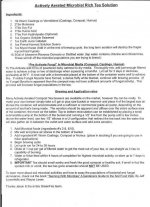Clayton_Bigsby
Active member
I was reading a thread about organic yields the other day and someone made a comment saying he thinks he hurt his yield by using to much compost tea. At first i just thought no thats probably not the reason for his low yield, but now, two day later im still trying to think how to much compost tea could be bad.
So my question is can to much compost tea be a bad thing?
So my question is can to much compost tea be a bad thing?




